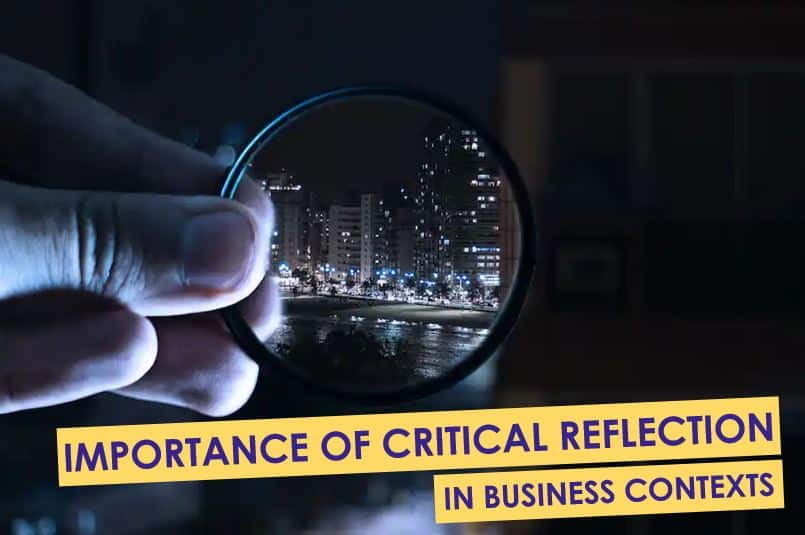Table of Contents
What is Critical Reflection?
Critical reflection is the analytical thought-process of recalling experiences and objectively analyzing what happened in those situations. The most direct way of doing this is to ask ourselves questions of how we approached those situations, how it affected or changed us, and what we can learn from this for the future.
This explanation should have made you realize that reflecting on experiences is a crucial part of any learning process, without which our development would not really be complete. If we do not think back and reflect on our experiences, we may forget the knowledge and skills that we gained along the way. The aim of critical reflection is to identify and describe key events and experiences and use these as the basis to understand why things happened the way they did. At the time, this conscious thought-process allows us to identify both strengths and weaknesses. Ultimately, the goal is to come up with an action plan to improve future performance.
Many business schools thrust theoretical knowledge upon their students without really encouraging them to fully understand and engage with it. If you want to become a better professional with self-accountability and continuous development, we highly recommend that you make critical reflection a routine part of your working style.
General Benefits of Critical Reflection
The biggest benefit of critical reflection is that it can allow you to unlock a greater level of understanding of your progress and development along the way. In general, reflecting on your actions can lead to benefits such as the following:
- Maximizes the learning outcomes from any situation
- Enables you to identify and work on your weaknesses to unlock your full potential
- Supports you in achieving higher levels of performance in the feature
- Helps you identify features which allow you to stand out from others
- Makes it easier for you to relate theory to practice in the future as well
- Shapes formulation of new theories and ideas based on your experiences
- Gives you clarity on what your values are in relation to your practice
- Empowers you to identify the need for change and how to go about it
- Prevents you from stagnating your progress in the corporate world

Importance of Critical Reflection in a Professional Environment
Apart from the general benefits mentioned above, critical reflection is an especially important skill to have in business contexts and in professional settings for various additional reasons. Some of these are listed below.
- Being able to critically reflect on a situation shows others around you that you can be objective about yourself and your experience
- It demonstrates to others that you are able to, and are keen on learning from past experiences and avoiding similar mistakes
- This indicates to future employers and managers that you approach things rationally and try to identify solutions rather than remain fixated on problems
- It also shows that you are committed to continuous development and self-improvement
Features of Critical Reflection
The main features of critical reflection are as follows:
- It is more than just a general description or summary of events
- It is aimed at relating theory to practice
- It requires conscious thought and effort to engage with your experiences
- However, you need to distance yourself from the experiences and look at them objectively
- In other words, you need to be an objective observer
- It requires analysis and evaluation of experiences to generate meaningful conclusions
Reflective Practice in the Workplace
Reflective practice refers to the active engagement in reflection on exactly what you are doing as you are doing something. It involves thinking about why you approached something the way that you did and what tools or knowledge you used to accomplish a task. This can help you take a step back to critically reflect on whether there may a better way to do the same thing. Perhaps there’s a better tool for the job. Maybe there is some gap in your knowledge which could potentially help you do the job easier or more quickly.

Here’s how this might look like in a real-life context. Say you are a junior level strategy analyst who needs to find relevant information and data, compile them together and put together a summary for management to extrapolate decisions from. As you are doing the steps involved in this situation, you should make a note of how you are going about finding the data and compiling it. You should ask yourself like the following examples.
- Is there a way to do these tasks more easily?
- Are there better sources of the information which you need?
- Can something be automated?
- What tools will make me finish these steps more quickly?
You can use your answers to these questions as signposts for how to deal with these kinds of situations more easily and effectively in the future. You would then repeat a similar process for the remaining tasks that you need to do. So, when you sort the data and put together your summary report, you could make additional notes by asking some more questions like the following.
- Are there some tools that will help organize and present the information better?
- Is something I need to learn to understand the material better?
- How will management react when they see this summary?
- Is something I could do to make the material easier for them to digest?
By doing this kind of constant reflective practice in the workplace, you are going to see your productivity improve significantly. This is sure to get you recognition from the higher ups and pave your path to climbing up the corporate ladder more easily.
Reflective Leadership and Management
Reflective leadership is also about challenging pre-conceived and established ideas and approaches to help elevate the performance and efficiency of yourself and those around you. It requires you to consciously consider at all times whether the best approach is being taken to solve a certain problem or arrive at a desired outcome. Reflective leadership is often meant to provide better motivation and encouragement.
On the other hand, reflective management refers to the use of critical reflection to guide and improve decision-making skills in particular. It helps bridge the gap between what we think should solve a certain problem and what actually solves the problem. In comparison to reflective leadership, reflective management is broader and can be practiced at any level of the company. Reflective practice should considered an essential part of a leader or manager’s approach to strategy planning.
Although reflective practice is often reactionary, critical reflection in business contexts should also be anticipatory. What this means is that the reflective practice must be commenced even before we approach a certain action or event. This could involve thinking in advance about what you might do in a certain situation and how you might react or resolve the things that come up. Once the event has come to pass, the critical learning process can be closed out by considering whether your anticipated approach was suitable or not. This can help you take better and faster decisions when faced with similar situations in the future.
Questions for Reflective Leadership, Management and Strategy
The following are some examples of questions which you can ask yourself at the start of a strategy planning or formulation exercise.
- What were your initial assumptions and approach to strategy formulation?
- What was your intended outcome of strategy planning at the beginning?
- Are you open to taking input and suggestions from others during strategy planning?
Here are some questions that you can think about while the brainstorming and planning of strategy is underway.
- How do you feel about the way the strategy planning process is headed?
- Are you satisfied with the strategy options and alternatives that you have come up with?
- Are there any other avenues of strategic direction that you have not explored yet?
- What seems to be have worked well so far, and are we continuing to rely on them?
- What new ideas have we adopted to improve our strategy planning?
At the final stage of the strategy-making process, you could potentially explore the following questions to close out the process strongly.
- What new things have you learnt from the strategy planning process?
- Did the process challenge or change your initial assumptions and approach?
- Are some specific theories of strategy planning that you relied on more than others?
- What were the hiccups that you faced during the process?
- How can you overcome these challenges and make future strategy planning simpler?

